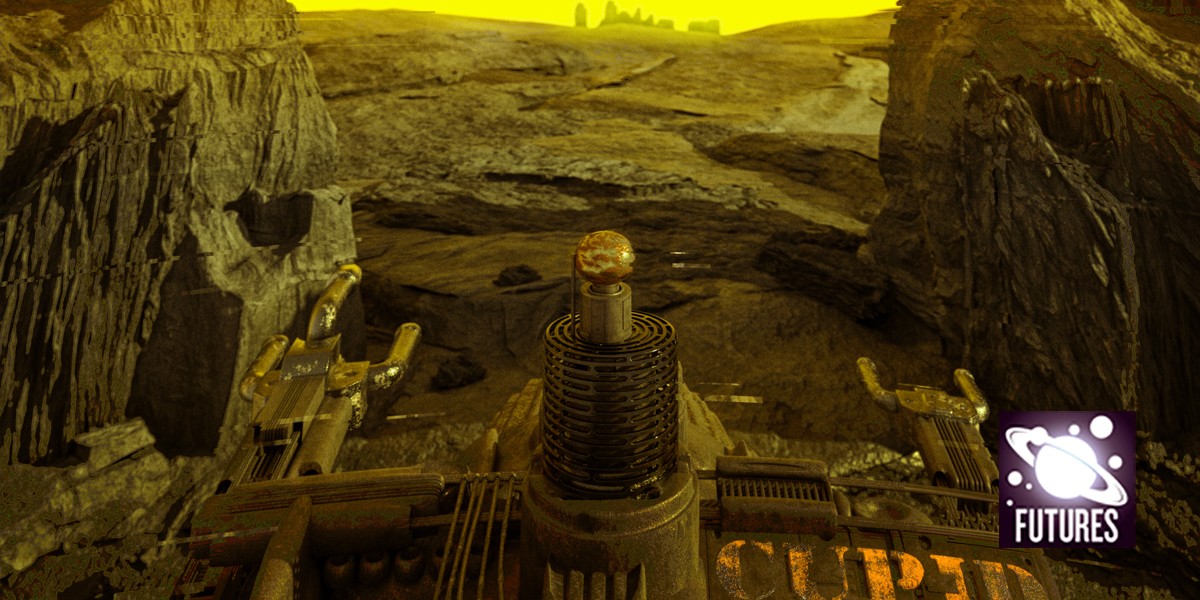Afrodi sat on the very edge of her seat. They were here, they were finally here. Like the rest of her team, her eyes were glued to the full-wall screen. Venus: the final frontier.
Not that the public thought that, of course: completely uninhabitable was completely uninteresting. Afrodi couldn’t disagree more. She’d been enamoured with Venus ever since childhood, staring up at it through her mum’s telescope. A perfect, rose-tinted disk. She’d loved the constellations, loved the other planets, but none had captured her like Venus. She felt drawn to it.
As a teen, Afrodi had observed the public’s obsession with Mars. She read Kim Stanley Robinson’s Red Mars, listened to talks about a Mars landing, of potential colonization plans. She couldn’t understand the appeal. The next summer was the hottest on record, with each year after predicted to be ever hotter. Who wanted to live in a dusty red desert? People think Mars is Earth’s closest relative — but they’re wrong. Mars is small, more akin to the Moon. Venus is Earth’s dangerous sister.
At university she’d studied astrophysics, absorbing everything she could about Venus’s history. She learnt that once, perhaps a billion years ago, Venus could have been habitable. Afrodi found this enchanting. What would it have been like on the surface? When they first found hints that there might have been life on Mars, her classmates buzzed with excitement. But why should she care about crusty old Mars when Venus rained diamonds?
Read more science fiction from Nature Futures
Top of her class was a boy named Res, from Greece. He wanted to be the next Michael Collins, overseeing his very own Neil and Buzz to their safe landing on Mars. He told everyone about Collins’s joke with the Moon landers, that they should say ‘Oh God, what is that thing?’ and cut their mic. He told everyone he had something even funnier he’d make his crew say. Afrodi wasn’t sure Res had the right impression of Collins’s job, but she didn’t care to correct him. Instead, she kept her nose down and learnt everything about Venus.
The biggest problem astronomers had in viewing the surface was the temperature, which regularly rose to more than 800 K: robot-meltingly and electronic-fryingly hot. The picture they did have was mainly from spectroscopic data and wavelength information, rather than anything seen. Afrodi did a master’s in materials, and a joint PhD in robotics and astrophysics. She wanted to see Venus under her protective shell. She learnt about tungsten, which would withstand temperatures about ten times Venus’s heat. She risked her life hanging around active volcanoes, testing her tungsten-crafted cooling mechanisms and a heat-resistant nanopolymer designed by one of her classmates.
When she got an active picture from the inside of a volcano, Afrodi leapt for joy. It would be possible. Her dream would be possible. She left the robot down there for four weeks, just to be completely sure, and once she pulled it out she sent it to Antarctica, to see if it could handle the cold of space.
Res was in her postdoc programme. He didn’t remember her. She didn’t care. They worked together under a disinterested supervisor. Res told her he’d hoped to work on a Mars project, but slots were highly sought after and he’d missed out on a place, which is why he’d been stuck with this second-rate Venus shit. He asked her what she’d wanted to do. She told him they were going to be the first to see the surface of Venus and he should grow up — but in more colourful language.
He was a nuisance for the next two or so months, rabbiting on about Mars. She learnt to tune it out, like the trains passing her window at night.
Gradually — as they worked together on the templates she had for a robot, figured out landing gear, how to get it into space, the trajectory and timing — his Mars worship stopped. She was quiet and introspective, and he did not pick up enthusiasm, exactly, from her, but he grew to appreciate Venus nonetheless. In his own way.
Their first date was to the observatory in Tartu, Estonia. He’d planned the trip without telling her where they were going, held her hand as they gazed up at Venus’s pink-gold surface. London was on fire while they were away. She’d had to pay for the taxi to get home, as surge pricing ballooned it to twice his budget. But he didn’t complain, eating packed cheese sandwiches every day for the next month to pay her back. She accepted only half.



